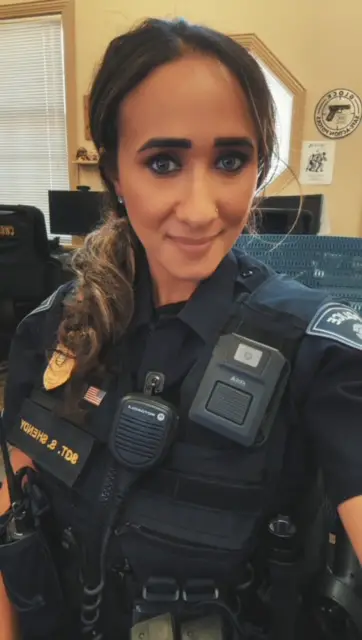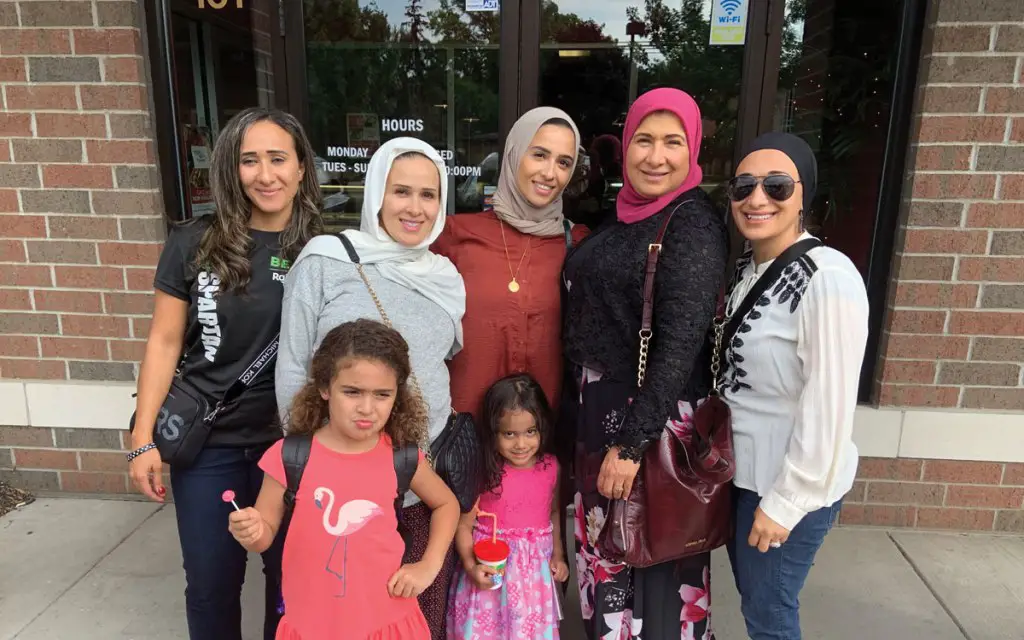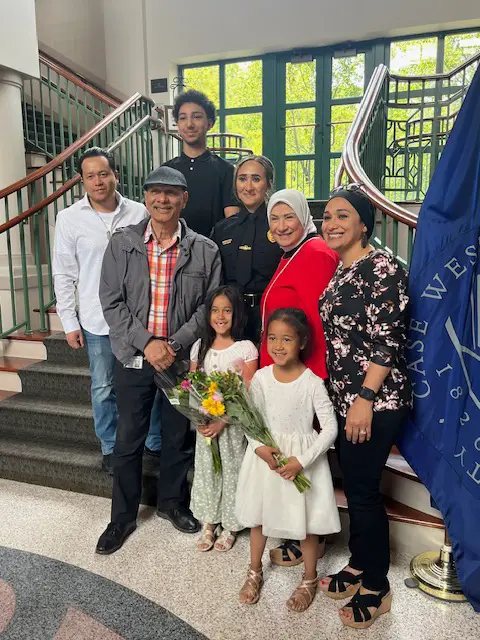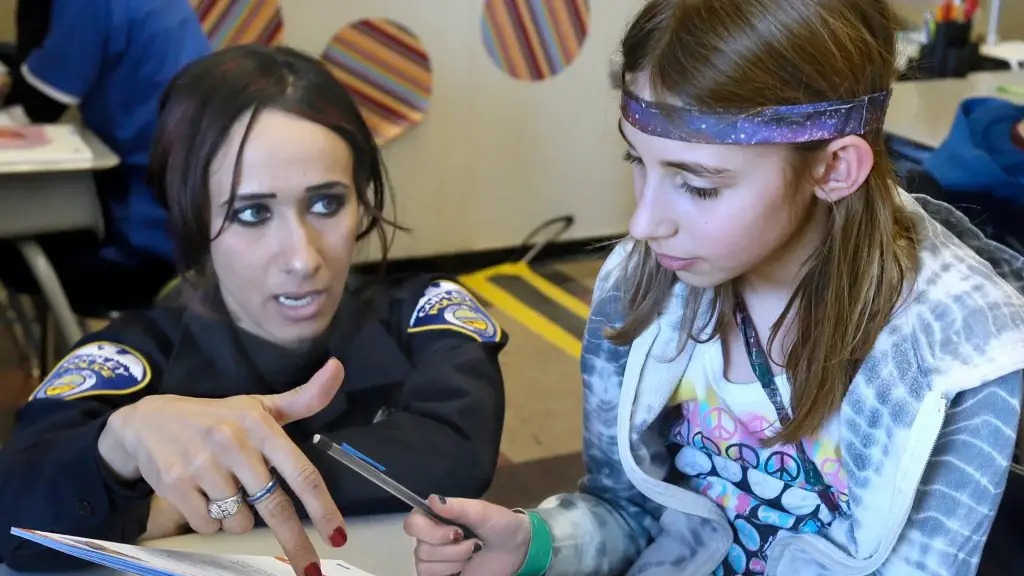November 28, 2023
May Allam

Egyptian American Sarah Shendy has been serving with the police department for 15 years, and was appointed in 2020 as Director of Ohio’s Office of Law Enforcement Recruitment by Governor Mike DeWine. Sarah Shendy lived in Egypt and Saudi Arabia before moving to the United States with her family in 1990, at age 6. After Sarah graduated from Kent State University with a bachelor’s degree in justice studies, she joined Kent State Police Academy to become a law enforcement officer.
After graduating from the police academy, she first worked as a corrections officer for a juvenile detention center. In 2012, she earned a master’s degree in criminal justice with a minor in global issues from Kaplan University. In the same year, she developed an independent training program to guide police officers on diversity and how to interact with Middle Eastern and Muslim communities.
She was also recruited as a Law Enforcement Training Officer for the Ohio Peace Officer Training Academy, where she taught from 2016 to 2020.
In October 2022, she received the IACP (International Association Of Chiefs of Police) 40 Under 40 Award. She was the only police officer from Ohio, and the only Arab-American officer to receive the award during a ceremony that included 15,000 police officers from around the world.

WoE: Why were you interested in enrolling in the Kent State Police Academy? Were you not worried about the nature of the job being tough for a female?
Sarah Shendy: I have wanted to be a police officer ever since I was a little girl. Growing up in the Middle East and coming to America, it was fascinating to see how different law-enforcement was, and how community driven it is. I always lacked the confidence to believe that I could be good enough to end up in uniform. While I wasted so much time and energy doubting myself, I was always surrounded by people that believed in me and put me in a position to win. My professor at Kent State University encouraged me to attend the police academy after I graduated college and I have been in love since. I fell in love with the paramilitary structure and the camaraderie in the academy. I also love and admire anything that challenges me. I have had that mindset for a long time because fear and limitations are something that we create and place upon ourselves. If it’s challenging, and seems impossible, I want to do it. Not once, but twice. When I went to the police academy, I didn’t tell my parents. I told them after I graduated. They thought that it was a phase for me, and almost 16 years later, here I am. A lot of people think that the job is tough, and it is. Sometimes especially for women. But we are needed in this profession for so many reasons. I think other jobs are hard too, like being a parent, a teacher, a nurse, or a doctor. It is a great thing that we have different strengths. A lot of people cannot do my job and I cannot do theirs.

WoE: How did it feel to be from a minority group, race and ethnic origin, in the police department in Ohio?
SS: There are over 32,000 police officers in the state of Ohio. And around 960 police departments. Police departments are becoming more and more diverse, but this is still a male dominated profession. A lot of departments are working on their recruitment and retention strategies to try and mirror the communities that they serve. Despite their great efforts, sometimes it is still very hard. As I mentioned, in my first response, I love a good challenge. A lot of things were hard for me, but I am happy and feel privileged to be the first in a lot of things. It makes me feel honored that I get to pave the path for others.
SS: I designed my Islam in America class in 2012 to help law enforcement understand how to effectively interact with Muslims and the Arab American community. I did this because I saw that there was a need for it and so many of my colleagues really misunderstood my culture and religion. I heard conversation about the Arab American and Muslim community and not a single thing that was said was factual. It was all very fear driven, and to me, that is a huge problem. As police officers, we must understand and respect every community that we serve without bias. It’s impossible to know everything about every community, but I wanted to try and bridge the gap between my two families that I care about the most: my Arab American Muslim family and my law-enforcement family. The class has been and is very well received. The comments and feedback that I get afterwards are always very encouraging and motivate me to want to do more.
WoE: After you developed your program to guide police officers in dealing with minority representation in the police force, can you tell us the main reason that pushed you to develop this program? Were you going through bias and thus this provoked you to make this program?

WoE: After working for over a decade for the police force in Ohio, can you relate to us how tough the challenge was as a young, Arab woman in the force?
SS: Next April will mark my 16th year anniversary in uniform. It has been the love of my life. The job is honestly hard on anyone. The average person experiences 4 to 7 critical incidents in their lifetime, while a police officer experiences 400 to 700 by retirement. The things that we see, hear, smell, and feel, no human being should have to deal with. But we do, 40 hours a week and sometimes more. The direct and vicarious trauma is very impactful to us and our families. The job is also very hectic and demanding physically. From being out in the heat to below zero-degree weather. We don’t get to pick and choose when to respond to calls and the amount of times we are put in danger throughout our shift. The job was hard for me, yes, but it is really difficult for everybody else too. Some of the challenges that I have experienced have been unique to me because of my culture, religion, and background. Many people in my path have always tried to undermine me or make me feel weaker because I am a woman. Little do they know, everything that they believe is a weakness about me, helped me rise and succeed. For example, the ability to be vulnerable, compassionate, empathetic, and patient. Those are a few amongst many things that were practiced and preached to me while growing up. My differences have proved to be an asset, and not a liability.

WoE: Would you advise other women from Arab countries to do the same? Move to a new country and join a career that has predominantly male colleagues?
SS: This is a hard question to answer because everybody’s so different. Men and women get into this profession and realize that it is not for them. It is extremely difficult at times and it is not uncommon to see people leave the career shortly after joining or take an early retirement. There isn’t another profession where people do their job under the same circumstances that we do our job. Sure other professions are subjected to repeated trauma like within hospitals, and in the Armed Forces, except it is different because we get 25 to 30 years of trauma: and a little bit of it every single day, or every single shift. We also have to take into consideration our safety and the number of officers that we lose every single year to felonious assault and suicide. We do our job every day while risking getting killed. I would like to say that anyone is capable of doing this job, but I would add to that that it definitely takes an immense amount of sacrifice and courage.
WoE: How did your parents unconditional support encourage you to continue in your studies and ultimately your unique career path?
SS: My parents are the most amazing and wonderful people that I know. Although I was afraid to tell them that I went to the police academy and that I wanted to chase my dreams of being a police officer, they have been nothing but overwhelmingly supportive since day one. They have celebrated all of my accolades, work anniversaries, and show up to every event that I organize or helped host. They make me feel so valued and appreciated. I always believe that one of the biggest reasons God keeps me safe and protected is due to my parent’s prayers.

WoE: What effect did coming from a different background, culture and religion have on your career?
SS: This has been the biggest blessing to me as a police officer. Being raised in an Arab American and Muslim household has made me the officer that I am today. My parents showed and taught me compassion and empathy, which are foundational pillars to me when it comes to policing. Not everybody was raised like that, and not everybody policies in that manner. Because of what Islam values and teaches, I was raised to always put service above self, feel for other people’s pain and tragedies, and do everything I can for everyone I encounter. Sadly, that’s not how others get treated or operate. People have always told me on calls, especially very sad calls, that I am “different than everyone else that they met.” I simply tell them that I am carrying out my cultural expectation and religious duties. It is how I was raised. It is how I treat everybody around me. My upbringing is definitely one of the main contributors to my fulfillment and success.

WoE: Were there any instances that your background restricted some of your actions or judgment?
SS: This is such a great question. My background and religious beliefs have never restricted my actions or judgment, the opposite has taken place. As an officer, one of the biggest and best tools that we have is officer discretion. While I put officer safety at number one every time, I also use my discretion when it comes to decision-making. I know that I have a job to do and that enforcing the law is one of many of our priorities. However, my second priority is always taking care of that person however I can and not doing anything to abuse my power or make their day or the incident worse than it needs to be. I always remember something that I was taught growing up about my religion. God says “show mercy to others, so that I may show mercy on you.” We all know the golden rule, I take it a step further and treat everybody like I want my parents to be treated. Regardless if people are respectful or hostile towards me, I do my job safely and with the utmost integrity. I try to change their perception and perspective of law enforcement. I know a lot of times it’s an attack on the uniform and not an attack on me as a person.

WoE: As a role model to other Egyptian women wishing to pursue the same career and maybe reach the Director position you reached, what qualities do you think they need to have to begin with?
SS: Nothing beats hard work and doing all of the right things with the right intentions. It is your everyday habits and routines that build your name, brand, and reputation. It is what you do every single day. Not when you are happy, not every Friday, but every single day. Some people are born with talent, some people are born with skill, and some people are born with financial privilege that the majority of us lack. I have met people from all walks of life that have those three things but they still struggle in their personal and professional life in terms of fulfillment, because they lack intrinsic motivation and the ability to consistently work hard. Discipline is also a must. We’re not going to wake up every day thrilled to eat healthy, work out, do homework, or go that extra mile for someone that needs help. Discipline is so important because it kicks in when motivation is absent. The one other thing that I feel is important to revisit when we lack motivation is knowing your “why?” Why are you doing what you’re doing? What are you hoping to achieve? My goal is to build a legacy. One that I am able to see while I am alive and one that lives on when I am no longer here. I am extremely driven and committed to making the world a better place.

WoE: Do you think you could train other female officers on how to adjust and adhere to severe work standards, being a minority in the workforce?
SS: I can and I do. I’m very big on leadership and mentorship. I am currently mentoring a handful of female officers and a couple of young women in the police academy. I know how my life changed when I had the right people around, so I try to be that for others. The people that we surround ourselves with really dictate a lot of our potential and the outcome of our future. I surround myself with winners. People that are kind, humble, optimistic, and don’t give up. I do not surround myself with people that are pessimistic, complain, have a negative mindset, or bully others. Mentorship is so important and something that we can all benefit from. I tell people all the time, “if it’s important to you, it is important to me.” Anybody that has a goal in mind, whether it’s losing weight, finishing a degree, or completing the police academy, I ask them to put in 100% and I promise to put in 110%. I love being a part of people’s success.

WoE: What advice would you give to Women in Egypt to study and follow their passion, even if it is unconventional?
SS: Chase your passion, not your paycheck. Money is going to come sooner or later. What’s more important is that we are happy and fulfilled with our job and what we are choosing to do with our time. As adults, we all work so much. Many of us spend more time at work than we do at home. So why not do something that you love? Like the saying goes, “if you do something you love, you’ll never have to work a day in your life.” And that is absolutely true. Your family may not see your dream, but it wasn’t given to them. Your friends may not see your vision, but they are not looking at things through your lens. A lot of people may doubt you, but it’s up to you to find the reason and the motivation to keep going. For some, success may come overnight, for others, like my case, it may take a decade or a decade and a half. While staying focused on your final destination, it is very important to also enjoy the journey. Through our journey, we are offered many opportunities for growth and development. It is important for us to celebrate the small wins. Everything in life that is worth having is worth waiting and working for.
***If you liked this article, don’t forget to subscribe to our newsletter and receive our articles by email
